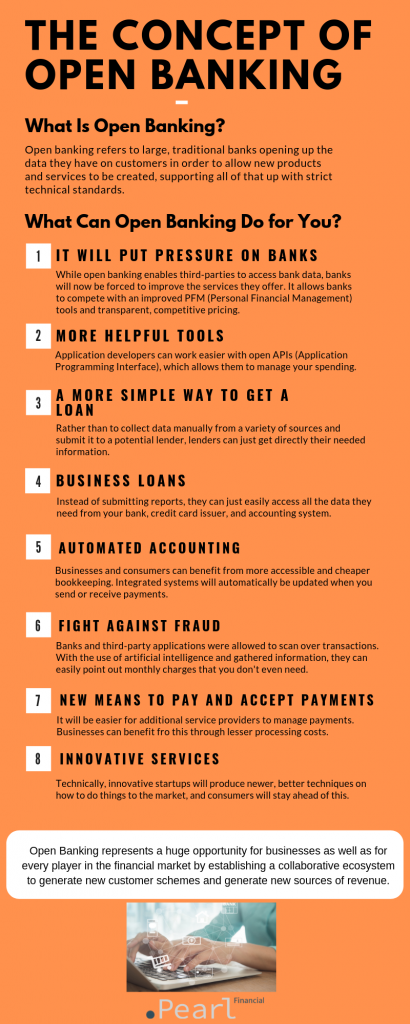
Open banking refers to large, traditional banks opening up the data they have on customers in order to allow new products and services to be created, supporting all of that up with strict technical standards.
In essence, it allows customers to share their financial transaction data with authorized third parties, and allow authorized third parties to accept payments from their bank accounts.
Open banking activities are a big thing for banks, regulators, and startups. With regards to consumers, you will have more options for borrowing, managing your money, and making payments.

While open banking enables third-parties to access bank data, banks will now be forced to improve the services they offer. Instead of letting someone else manage the messages you receive, it allows banks to compete with an improved PFM (Personal Financial Management) tools and transparent, competitive pricing.
You can expect to see other third-party PMF tools. Application developers can work easier with open APIs (Application Programming Interface), which allows them to manage your spending. With the help of AI (Artificial Intelligence), perhaps they can foresee events in your account or suggest products at a lower cost.
However, some applications might not promote the best products or services. Instead, they might suggest the ones that pay them affiliate or referral fees. Thus, the best one is still for you to decide.
Through Open Banking, it may now be easier to acquire a loan. Rather than to collect data manually from a variety of sources and submit it to a potential lender, lenders can just get directly their needed information. It can allow lenders to have the latest information, access your checking and savings accounts along with the ability to download transactions for alternative lending options.
If ever your business needs to get a loan or drawdown on a line of credit, lenders can just review your books easily. So instead of submitting reports, they can just easily access all the data they need from your bank, credit card issuer, and accounting system.
Businesses and consumers can benefit from more accessible and cheaper bookkeeping. Integrated systems will automatically be updated when you send or receive payments.
Banks and third-party applications were allowed to scan over transactions. With the use of artificial intelligence and gathered information, they can easily point out monthly charges that you don’t even need. Through Open Banking standards, it is now easy to use that information, and you get to view more accounts.
This is not obviously new as PayPal is a non-bank product that you may have used already. However, with open banking, it will be easier for additional service providers to manage payments. Businesses can benefit fro this through lesser processing costs.
Technically, innovative startups will produce newer, better techniques on how to do things to the market, and consumers will stay ahead of this.
Open Banking represents a huge opportunity for businesses as well as for every player in the financial market by establishing a collaborative ecosystem to generate new customer schemes and generate new sources of revenue. Therefore, banks and fintechs will compete with a general objective of providing a better customer experience.
Session expired
Please log in again. The login page will open in a new tab. After logging in you can close it and return to this page.